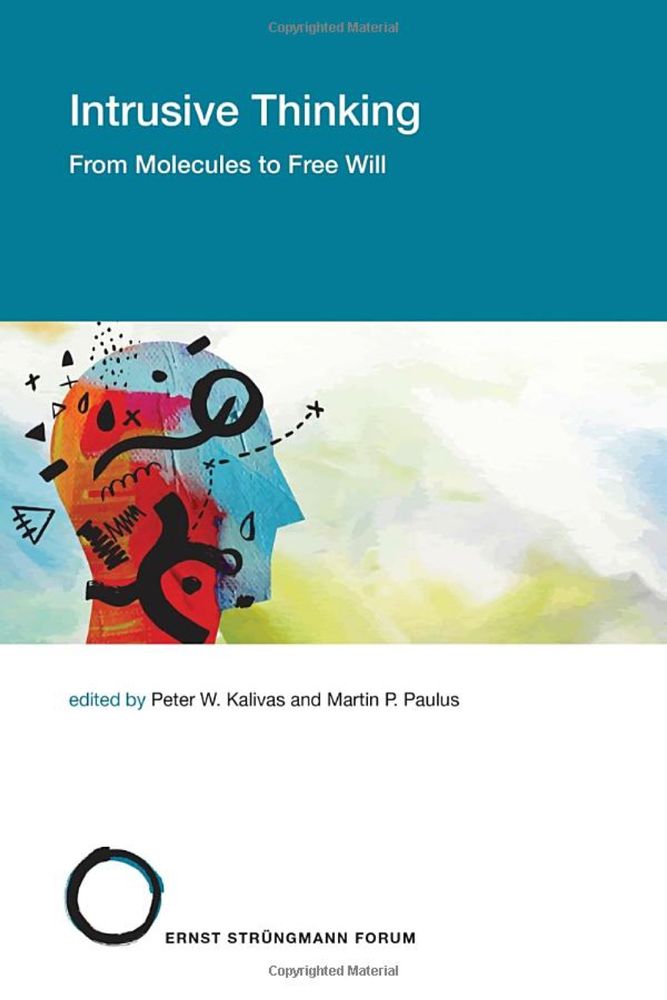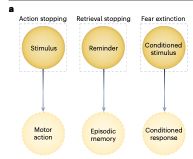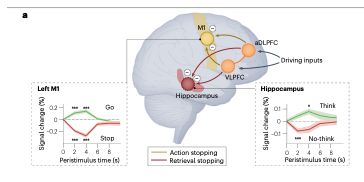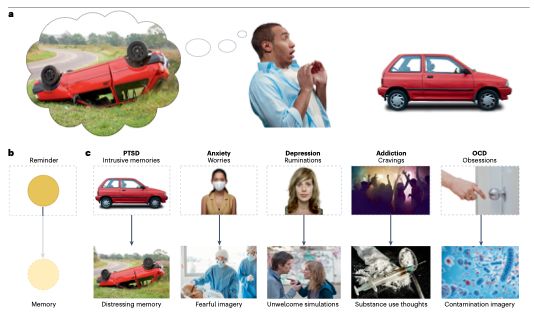
Michael C. Anderson
@memorycontrol.bsky.social
Neuroscientist at MRC Cognition an Brain Sciences Unit at the University of Cambridge, studying memory, cognitive control, and mechanisms of adaptive forgetting
To my complete surprise, our Nature Reviews Neuroscience review on the Brain Mechanisms Underlying the Inhibitory Control of Thought has landed on the cover! Cover art below! For an "explainer thread", see earlier tweet. bsky.app/profile/memo...
@mrccbu.bsky.social
#neuroskyence #memory #ptsd
@mrccbu.bsky.social
#neuroskyence #memory #ptsd

June 24, 2025 at 12:26 PM
To my complete surprise, our Nature Reviews Neuroscience review on the Brain Mechanisms Underlying the Inhibitory Control of Thought has landed on the cover! Cover art below! For an "explainer thread", see earlier tweet. bsky.app/profile/memo...
@mrccbu.bsky.social
#neuroskyence #memory #ptsd
@mrccbu.bsky.social
#neuroskyence #memory #ptsd
Addressing intrusive thinking is a vital mission in clinical neuroscience and psychiatry. Several years ago, 40 scientists from around the world gathered in an Ernst Strugman forum on Intrusive thinking, organised by Peter Kalivas and
@mpwpaulus.bsky.social and facilitated by Julia Lupp.
@mpwpaulus.bsky.social and facilitated by Julia Lupp.

May 20, 2025 at 9:36 AM
Addressing intrusive thinking is a vital mission in clinical neuroscience and psychiatry. Several years ago, 40 scientists from around the world gathered in an Ernst Strugman forum on Intrusive thinking, organised by Peter Kalivas and
@mpwpaulus.bsky.social and facilitated by Julia Lupp.
@mpwpaulus.bsky.social and facilitated by Julia Lupp.
We also discuss the idea that affective stopping engages the same domain general prefrontal components as retrieval stopping, providing an account of fear extinction's benefits. @stevemaren.bsky.social en.bsky.social �½� joeydunsmoor.bsky.sococial @thephelpslab.bsky.social

May 20, 2025 at 9:36 AM
We also discuss the idea that affective stopping engages the same domain general prefrontal components as retrieval stopping, providing an account of fear extinction's benefits. @stevemaren.bsky.social en.bsky.social �½� joeydunsmoor.bsky.sococial @thephelpslab.bsky.social
Our article integrates 25 years worth of research on the cognitive and brain mechanisms underlying retrieval stoppping. Retrieval stopping shares prefrontal and striatal components with action stopping, but instead modulates hippocampal and cortical regions that represent thoughts.

May 20, 2025 at 9:36 AM
Our article integrates 25 years worth of research on the cognitive and brain mechanisms underlying retrieval stoppping. Retrieval stopping shares prefrontal and striatal components with action stopping, but instead modulates hippocampal and cortical regions that represent thoughts.
Indeed, persistent intrusive thoughts are usually retrieved in response to reminders. If so, stopping unwanted thoughts would involve recruiting inhibitory control to stop their retrieval, given a cue. This conceptualization captures every form of intrusive symptom across psychiatric disorders.

May 20, 2025 at 9:36 AM
Indeed, persistent intrusive thoughts are usually retrieved in response to reminders. If so, stopping unwanted thoughts would involve recruiting inhibitory control to stop their retrieval, given a cue. This conceptualization captures every form of intrusive symptom across psychiatric disorders.
And response inhibition will NOT be influenced by parts of thought stopping circuitry unique to the latter. It's a little like testing models of audition by using a using a visual task. No matter how precise, elegant, and simple your visual task is, it's at best partially relevant to your goal.

May 20, 2025 at 9:36 AM
And response inhibition will NOT be influenced by parts of thought stopping circuitry unique to the latter. It's a little like testing models of audition by using a using a visual task. No matter how precise, elegant, and simple your visual task is, it's at best partially relevant to your goal.
But there is one problem. Stopping motor actions does not invoke thought inhibition, and cannot be used to identify its unique properties. Stopping actions must be achieved by affecting motor cortex; stopping thoughts, by affecting cortical areas represent the thought. The pathways must differ.

May 20, 2025 at 9:36 AM
But there is one problem. Stopping motor actions does not invoke thought inhibition, and cannot be used to identify its unique properties. Stopping actions must be achieved by affecting motor cortex; stopping thoughts, by affecting cortical areas represent the thought. The pathways must differ.
So how do we stop thoughts? What does neuroscience have to say? Scientists studying intrusive thoughts have leaned on inhibitory control, a mechanism that enables us to stop. When you stop yourself from grabbing a hot pot on the stove before your burn yourself, you have inhibitory control to thank.

May 20, 2025 at 9:36 AM
So how do we stop thoughts? What does neuroscience have to say? Scientists studying intrusive thoughts have leaned on inhibitory control, a mechanism that enables us to stop. When you stop yourself from grabbing a hot pot on the stove before your burn yourself, you have inhibitory control to thank.
Critically, thought stopping is central to mental health. Intrusive thoughts are hallmark features of many disorders: Intrusive memories in PTSD; pathological worry in axiety; rumination in depression; obsessive thinking in OCD; hallucinations in schizophrenia; craving thoughts in addiction.

May 20, 2025 at 9:36 AM
Critically, thought stopping is central to mental health. Intrusive thoughts are hallmark features of many disorders: Intrusive memories in PTSD; pathological worry in axiety; rumination in depression; obsessive thinking in OCD; hallucinations in schizophrenia; craving thoughts in addiction.
Indeed, in today’s world, we have much to think about; but less obviously, we also have much to NOT THINK ABOUT.The burden of things we try not to think about has grown weighty: the Ukraine war; chaotic American politics; the rise of right-wing extremism; and climate change, e.g. We all can feel it.

May 20, 2025 at 9:36 AM
Indeed, in today’s world, we have much to think about; but less obviously, we also have much to NOT THINK ABOUT.The burden of things we try not to think about has grown weighty: the Ukraine war; chaotic American politics; the rise of right-wing extremism; and climate change, e.g. We all can feel it.
Why is thought stopping vital? First, concentration.We all know the challenge to remain focused, of banishing distracting thoughts. @themindwanders.bsky.social and Kalina Christoff have learned much about mind wandering. Thought stopping is our rebuttal to these excursions, a reassertion of control.

May 20, 2025 at 9:36 AM
Why is thought stopping vital? First, concentration.We all know the challenge to remain focused, of banishing distracting thoughts. @themindwanders.bsky.social and Kalina Christoff have learned much about mind wandering. Thought stopping is our rebuttal to these excursions, a reassertion of control.
Congratulations to Ken Paller, this year's recipient of the George Miller Award at the Cognitive Neuroscience Society meeeting! Superb talk on his work on sleep and memory.
@cogneuronews.bsky.social @paller.bsky.social
@neurosky.bsky.social
@cogneuronews.bsky.social @paller.bsky.social
@neurosky.bsky.social

April 4, 2025 at 8:52 AM
Congratulations to Ken Paller, this year's recipient of the George Miller Award at the Cognitive Neuroscience Society meeeting! Superb talk on his work on sleep and memory.
@cogneuronews.bsky.social @paller.bsky.social
@neurosky.bsky.social
@cogneuronews.bsky.social @paller.bsky.social
@neurosky.bsky.social
Incredibly pleased to have @janw.bsky.social
as a joint Chaucer/Zangwill club speaker here at the
MRC CBU, co-sponsored with Cambridge Psychology!
as a joint Chaucer/Zangwill club speaker here at the
MRC CBU, co-sponsored with Cambridge Psychology!

November 10, 2023 at 1:40 PM
Incredibly pleased to have @janw.bsky.social
as a joint Chaucer/Zangwill club speaker here at the
MRC CBU, co-sponsored with Cambridge Psychology!
as a joint Chaucer/Zangwill club speaker here at the
MRC CBU, co-sponsored with Cambridge Psychology!

